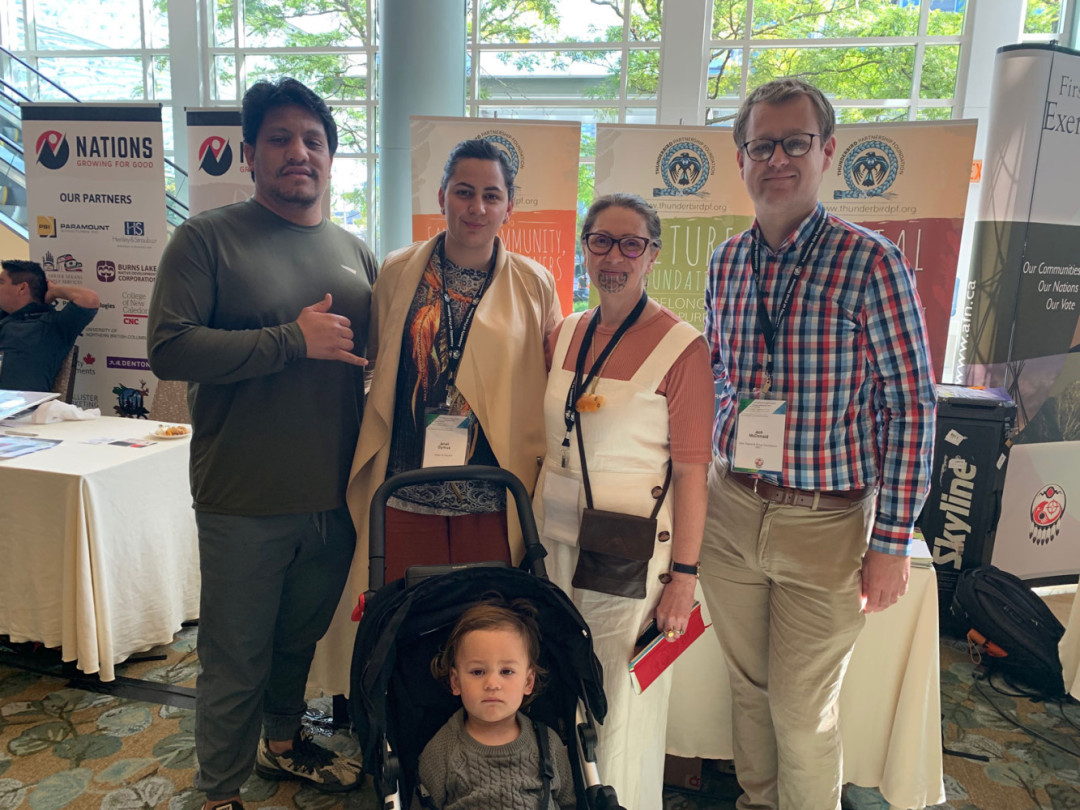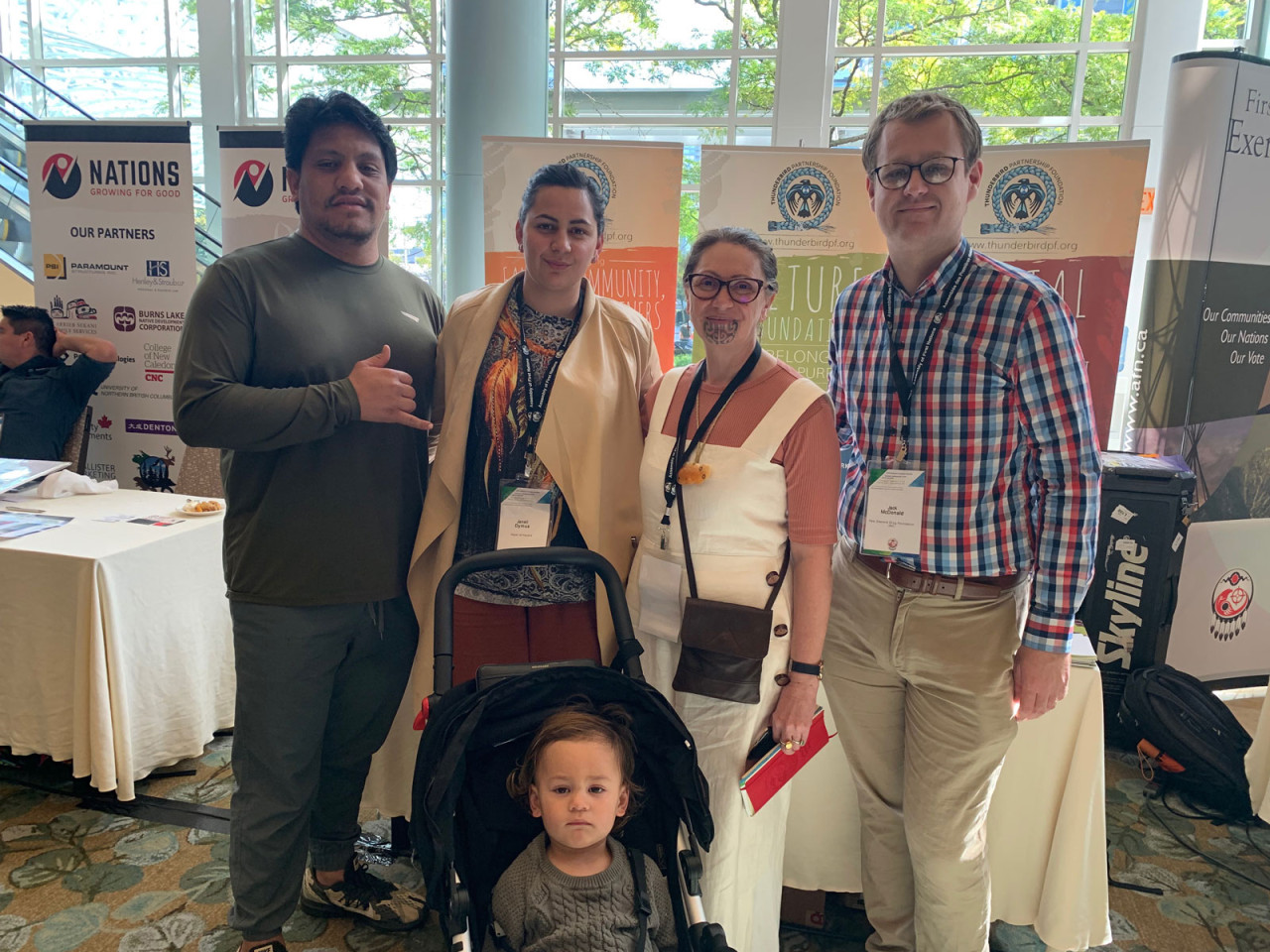Learning from Canada's First Nations


Representatives from Hapai, Te Rau Ora and NZ Drug Foundation stand in front of First Nations Signage at the Assembly of First Nations (AFN) Cannabis Summit. - Representatives from Hapai, Te Rau Ora and NZ Drug Foundation at the Assembly of First Nations (AFN) Cannabis Summit.
By Jack McDonald, Māori Advocacy Advisor
In September I had the honour of travelling to Vancouver for the Assembly of First Nations (AFN) Cannabis Summit. I am so grateful to the mana whenua, the Musqueam, Squamish, and Tsleil-Waututh First Nations, for their manaakitanga on their traditional unceded territory.
Canada legalised and regulated cannabis in October 2018, the second country in the world to do so. As we approach the cannabis referendum in Aotearoa, it’s incredibly important for us as tangata whenua to learn the lessons about how First Nations have engaged with legalisation.
It was great to attend the summit with Tracey Potiki from Te Rau Ora, and Janell Dymus-Kurei from Hāpai Te Hauora. We’ve been working closely on supporting Māori responses to the proposed regulatory framework, and on building a kaupapa Māori campaign for the referendum.
We had heard reports that the Canadian government’s engagement with indigenous communities on the design of the legal regulations was poor, and not nearly proactive enough. We wanted to ensure that we apply the lessons from Canada’s experience to our own here in Aotearoa and ensure that regulation is a step towards achieving better outcomes for Māori.
It became clear very quickly just how significant the issues with regulation are for First Nations communities. In his welcoming address, the AFN’s National Chief Perry Bellegarde described First Nations communities being excluded from licensing decisions as ‘economic racism’.
He felt the Government did little to try to involve the AFN or make specific provision for indigenous communities. However, there were also challenges to the AFN leadership from a few chiefs who were disappointed that they hadn’t been more proactive during the design of the regulations to get a better outcome.
Regardless of exactly why it happened, the result is that there are no specific mechanisms in the Cannabis Act 2018 for indigenous involvement in the legal market, and so First Nations are only left with the chance to further negotiate with provincial governments. The priority now is to try and reform the Act, so that it recognises First Nations jurisdiction.
Indigenous communities have responded to the lack of clear pathways in various ways. Some First Nations are trying to engage with the legal process, but as they are competing against large corporates, they have had limited success. There have been some positive developments in British Columbia, where a First Nations cannabis working group has been negotiating with the provincial government to get preferential access to the legal market.
Other First Nations have chosen to operate under their own customary legal frameworks. This means that there are dispensaries operating on First Nations lands that are outside the legal framework. This opens them up to significant risks including being raided by federal authorities, which would result in the dispensaries closed and profits seized.
There are many differences between First Nations experience and our own. However, there are also key similarities. Canada’s constitution recognises existing ‘aboriginal and treaty rights’ of indigenous communities, while we can leverage Te Tiriti o Waitangi obligations.
‘Nothing about us without us’ is an international rallying call of indigenous peoples, and it was mentioned at the summit. It couldn’t be more relevant than when it comes to drug law reform. Indigenous peoples are more likely to suffer harm from cannabis use, less likely to be able to access health treatment, and are far more likely to be convicted than other groups. The debate is about us; therefore, we must be front and centre.
In Aotearoa, that means regulations are designed with and by Māori, under a Te Tiriti o Waitangi framework, and work to promote the mana motuhake of whānau, hapū and iwi.
We have an opportunity to get it right now, rather than the more difficult job of seeking to change the legislation after the fact. Our Government’s proposed framework acknowledges that Māori are disproportionately harmed by prohibition and emphasises the need to protect Māori rights and interests should cannabis become legal. So far though, the Crown has not provided detail on how it intends to meet these obligations.
The most important thing that needs to happen is for whānau, hapū and iwi to be meaningfully engaged at each point in the development of the draft bill and regulations, through negotiation, and in a process of co-design.
We have a once in a generation opportunity to reduce the shocking level of drug harm in Māori communities once and for all. Let’s get it right.
Recent news

Untreated ADHD leading to addiction and drug harm
A new report shows New Zealand’s failure to adequately diagnose and treat ADHD is likely leading to significant drug harm, including from alcohol and nicotine.

Report: Neurodivergence and substance use
Our latest report pulls together international evidence and local experiences of how neurodivergence impacts drug use

What researchers at University of Auckland are learning from giving people microdoses of LSD
‘Microdosing’ psychedelics involves taking small, repeated doses of a psychedelic drug. Researcher Robin Murphy talks us through the latest Auckland University microdosing study.

